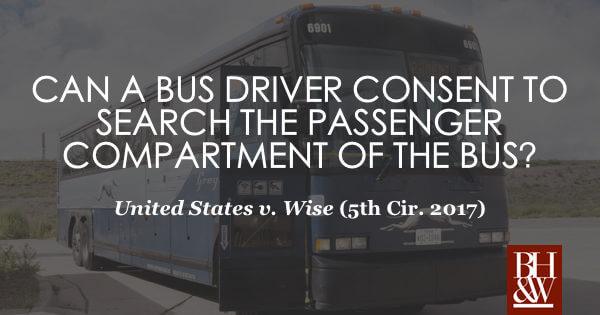Here are a couple of recent cases out of the Fifth Circuit regarding the 4th Amendment:
 United States v. Rico-Soto, 2012 U.S. App. LEXIS 16002 (August 2, 2012)
United States v. Rico-Soto, 2012 U.S. App. LEXIS 16002 (August 2, 2012)
A Border Patrol Agent conducted a traffic stop on appellant’s van and eventually arrested him for harboring illegal aliens. The court held the agent did not violate the Fourth Amendment’s prohibition against unreasonable search and seizure because the stop was supported by reasonable suspicion.
First, the van was traveling on Interstate 10, a major corridor for alien smuggling, and the agent had pulled over vans transporting illegal aliens on this route multiple times. Second, various characteristics of the van and its passengers added to the agent’s suspicions. The van was a fifteen-passenger model of the kind often used in transporting illegal aliens. There was a company name stenciled on the side of the van, but it was registered to a woman and not the transportation company. The agent knew that vans used to transport illegal aliens were often registered to individual women rather than to a transportation company. Third, the agent noticed that the passengers were seated in separate rows rather than clustered together as people normally would sit. Finally, the agent had specific information from his agency that this particular transportation company had become active in transporting illegal aliens. The agent’s 19 1⁄2 years of experience allowed him to recognize suspicious circumstances that might not be recognized by others and by themselves might not arouse suspicion, but when examined together, established reasonable suspicion to support the traffic stop.
United States v. Mubdi, 2012 U.S. App. LEXIS 16708, August 10, 2012
Two police officers stopped appellant after they both visually estimated that he was speeding and that he was following one of the officer’s patrol cars too closely. One of the officers issued appellant a warning ticket and then had him step out of his car while the other officer walked his drug-detection dog around it. After the dog alerted to the presence of drugs, the officers searched appellant’s car and found cocaine and two loaded firearms.
The court agreed with the district court, which held that the officers had probable cause to stop appellant for speeding because they were trained in estimating vehicle speed and that their testimony regarding appellant’s rate of speed was credible. The court further held that even if the officers were mistaken in believing that appellant was violating the law by following the officer’s patrol vehicle too closely, it was a reasonable mistake, which did not affect the officers’ probable cause to stop appellant for speeding.
The court held that after the officers issued appellant the warning ticket, they had reasonable suspicion to detain him for further investigation. First, appellant took an excessive amount of time to pull over and he was extremely nervous when talking to the officers. Second, during the stop, he kept his foot on the car’s brake pedal instead of shifting the transmission into park. Third, he could not provide details as to his destination or the family member he was going to visit. Fourth, he lied to the officer about who had rented the car; he was not an authorized driver of the car and the rental car was being driven out-of-state, which was prohibited by the rental contract. All of these circumstances supported the officers’ decision to extend the duration of the initial 3 traffic stop to conduct the open-air canine sniff, which eventually alerted the officers to the presence of contraband in appellant’s car.










